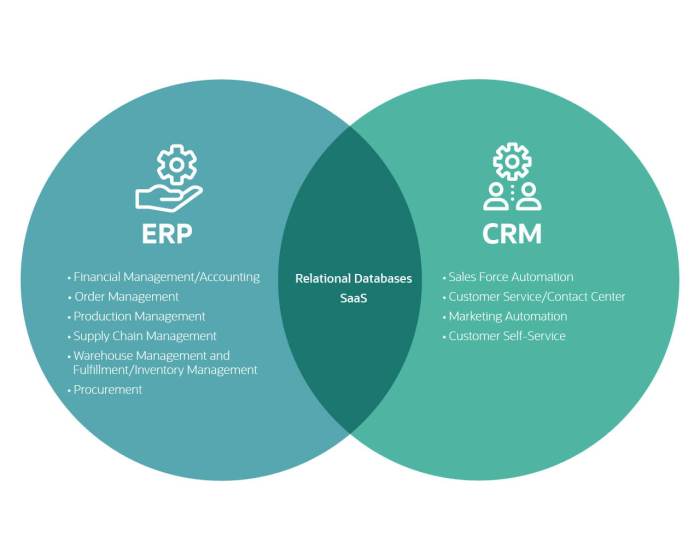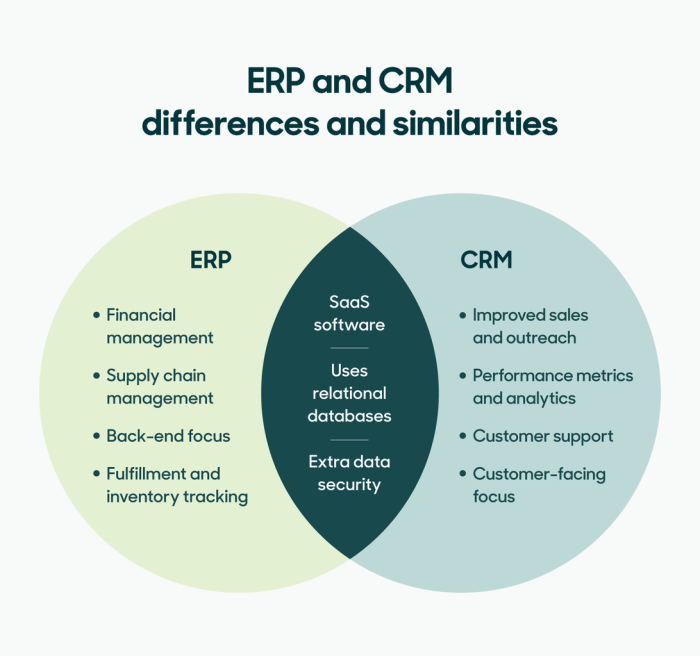Advantage CRM vs ERP: A Comprehensive Comparison. Delve into the realm of business software and uncover the intricate nuances that set Customer Relationship Management (CRM) and Enterprise Resource Planning (ERP) systems apart. This in-depth analysis will shed light on their fundamental differences, data management capabilities, integration potential, customization options, scalability, cost implications, and return on investment (ROI).
By unraveling the complexities of these systems, businesses can make informed decisions that drive operational efficiency, customer satisfaction, and overall growth.
As we delve deeper into the comparison of CRM and ERP systems, we will explore their strengths and weaknesses, highlighting how each system can cater to specific business needs. From data management and integration to customization and scalability, we will provide a comprehensive overview that empowers businesses to make strategic choices for their software infrastructure.
ERP and CRM Overview

ERP (Enterprise Resource Planning) and CRM (Customer Relationship Management) are two essential software systems for businesses of all sizes. ERP systems integrate all core business processes into a single system, providing a comprehensive view of the organization. CRM systems, on the other hand, focus on managing customer interactions and relationships.
Understanding the benefits of CRM and ERP systems can enhance your business operations. While these tools streamline processes, don’t overlook the importance of creating a visually appealing and functional workspace. Desain Interior: Elevate Your Spaces with Style and Functionality offers insights on transforming your interiors to inspire productivity and boost employee morale.
By integrating these design principles with your CRM and ERP strategies, you can create a holistic approach to business optimization.
ERP systems typically include modules for financial management, human resources, supply chain management, and manufacturing. CRM systems include modules for sales, marketing, customer service, and support.
Understanding the advantages of CRM vs ERP can help you optimize your business processes. If you’re considering buying a used car, this comprehensive guide will provide valuable insights on finding a good quality vehicle. Returning to our topic, CRM and ERP systems offer distinct benefits, including improved customer relationship management and enhanced operational efficiency.
Key Features and Functionalities of ERP Systems
- Financial management:ERP systems track all financial transactions, including accounts payable, accounts receivable, and general ledger.
- Human resources:ERP systems manage employee data, including payroll, benefits, and performance reviews.
- Supply chain management:ERP systems track the flow of goods and materials through the supply chain, from采购to delivery.
- Manufacturing:ERP systems manage the production process, including scheduling, inventory control, and quality control.
Key Features and Functionalities of CRM Systems
- Sales:CRM systems track sales leads, opportunities, and orders.
- Marketing:CRM systems manage marketing campaigns, track customer interactions, and generate leads.
- Customer service:CRM systems track customer inquiries, complaints, and resolutions.
- Support:CRM systems provide technical support to customers.
Data Management
Data management is a crucial aspect of both ERP and CRM systems. Both systems are designed to collect, store, and manage large amounts of data, but they differ in their specific capabilities and focus.
ERP systems are primarily focused on managing data related to the internal operations of a business, such as inventory, manufacturing, and finance. They provide a comprehensive view of all aspects of a business, enabling organizations to streamline processes and improve efficiency.
While understanding the advantages of CRM vs ERP can help businesses streamline their operations, staying informed about emerging technologies is crucial. For those interested in exploring the world of digital currencies, Coin Crypto: A Comprehensive Guide to the World of Digital Currencies provides valuable insights into the intricacies of cryptocurrency.
Returning to the topic of CRM vs ERP, it’s essential to evaluate the specific needs of a business to determine the most suitable solution for enhancing customer relationships and optimizing operations.
Customer Data, Advantage crm vs erp
CRM systems, on the other hand, are specifically designed to manage data related to customers and sales. They track customer interactions, preferences, and purchase history, providing businesses with a detailed understanding of their customers.
Transaction Data
Both ERP and CRM systems can manage transaction data, such as sales orders, invoices, and payments. However, ERP systems typically have a more robust set of features for managing complex transactions, such as those involving multiple currencies or international trade.
Other Types of Data
In addition to customer and transaction data, ERP and CRM systems can also manage other types of data, such as product information, employee data, and marketing data. The specific capabilities of each system will vary depending on the specific industry and business requirements.
Integration

Integrating ERP and CRM systems is essential for streamlining business processes and improving efficiency. An integrated system provides a single, centralized platform for managing all aspects of customer interactions and business operations, eliminating data silos and the need for manual data entry.
In the realm of business optimization, choosing between CRM and ERP systems can be a pivotal decision. However, when it comes to creating a harmonious living space, Decorating Your Home: A Comprehensive Guide to Transform Your Space offers invaluable insights.
This guide empowers you with practical tips and inspiration to transform your abode into a haven of comfort and style. While CRM and ERP systems enhance business processes, this guide focuses on enhancing the ambiance of your home, where memories are made and life unfolds.
Benefits of Integrated Systems
- Improved customer service:Integrated systems provide a complete view of customer history, preferences, and interactions, enabling businesses to provide personalized and proactive service.
- Enhanced sales productivity:Integration allows sales teams to access real-time data on customer orders, inventory levels, and shipping status, helping them close deals faster and increase revenue.
- Optimized supply chain management:Integrated systems provide visibility into inventory levels, production schedules, and supplier performance, enabling businesses to optimize supply chain processes and reduce costs.
- Reduced operational costs:Integration eliminates the need for manual data entry and reconciliation, saving time and reducing errors, leading to lower operational costs.
- Improved decision-making:Integrated systems provide access to real-time data and analytics, empowering businesses to make informed decisions and respond quickly to changing market conditions.
Best Practices
Implementing and using ERP and CRM systems effectively requires careful planning and execution. Here are some best practices to help you avoid common pitfalls and maximize the benefits of these systems:
Thoroughly define your business requirements before selecting and implementing an ERP or CRM system. This will help you choose the right system for your needs and ensure that it is properly configured to meet your specific requirements.
Data Management
Establish clear data governance policies and procedures to ensure that your data is accurate, consistent, and secure. This includes defining data ownership, access rights, and data retention policies.
- Regularly clean and update your data to remove duplicate or inaccurate records.
- Use data integration tools to connect your ERP and CRM systems and ensure that data is synchronized between the two systems.
Integration
Integrate your ERP and CRM systems with other business applications, such as your financial accounting system, supply chain management system, and marketing automation platform. This will create a single source of truth for your data and improve the efficiency of your business processes.
- Use an integration platform as a service (iPaaS) to simplify the integration process.
- Test your integrations thoroughly before going live to ensure that they are working properly.
Training and Support
Provide comprehensive training to your employees on how to use the ERP and CRM systems. This will help them get the most out of the systems and avoid costly mistakes.
- Offer ongoing support to your employees to help them with any questions or issues they may encounter.
- Regularly review your training materials and update them as needed.
Final Wrap-Up

In the ever-evolving landscape of business software, understanding the advantages of CRM vs ERP systems is paramount for organizations seeking to optimize their operations. By carefully considering the factors discussed in this comprehensive comparison, businesses can make informed decisions that align with their unique requirements.
Whether it’s enhancing customer relationships, streamlining data management, or achieving greater scalability, the insights provided in this analysis will guide businesses toward the optimal software solution that drives success.
User Queries: Advantage Crm Vs Erp
What are the key differences between CRM and ERP systems?
CRM systems focus primarily on managing customer interactions and relationships, while ERP systems provide a comprehensive view of an organization’s core business processes, including finance, supply chain management, and human resources.
How do CRM and ERP systems handle data management?
CRM systems specialize in managing customer data, such as contact information, purchase history, and communication preferences. ERP systems, on the other hand, handle a broader range of data, including financial transactions, inventory levels, and employee records.
Why is integration between CRM and ERP systems important?
Integration allows data to flow seamlessly between CRM and ERP systems, providing a unified view of customer information and business operations. This integration eliminates data silos and improves collaboration across departments.
How can customization benefit businesses using CRM or ERP systems?
Customization enables businesses to tailor CRM or ERP systems to meet their specific needs. This includes modifying workflows, adding custom fields, and integrating with other software applications.
What factors should businesses consider when evaluating the cost of CRM or ERP systems?
Businesses should consider licensing fees, implementation costs, ongoing maintenance expenses, and potential return on investment when evaluating the cost of CRM or ERP systems.





